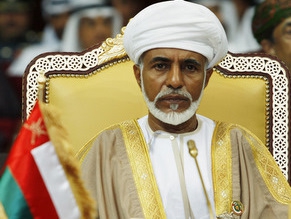|
World Jewish News

Oman's leader Sultan Qaboos bin Said. REUTERS/Fadi Al-Assaad/Files
|
Deaths in Oman protests
27.02.2011, Israel and the World At least two people have been killed in an industrial town in Oman, after police fired rubber bullets on anti-government protesters.
The military moved in to secure an area in the town of Sohar on Sunday where demonstrators had gathered to demand political reforms, according to witnesses reported by the Reuters news agency.
"Two were killed after being shot with rubber bullets as protesters attempted to storm a police station," a security official said requesting anonymity.
State news agency ONA confirmed that there had been casualties in Sohar, saying that police and anti-riot forces had clashed with demonstrators.
"Police and anti-riot squads confronted this group of wreckers in a bid to protect people and their properties, which caused casualties," it said.
Witnesses said a police station and a government building were set on fire.
Rising cost of living
Basma al-Rajhi, an Omani political activist, told Al Jazeera that she had heard reports that police had tried to block the protests leading to "clashes" with a number of young protesters.
The protests in Oman come amid rising political tensions in the Middle East and North Africa, with uprisings and protests in Bahrain, Tunisia, Egypt, and Libya.
Al-Rajhi, who was taking part in a sit-in in Muscat, the capital, said: "Omanis are calling for [the government to] combat corruption and fight the rising cost of living, in addition to many other issues, [such as] raising salaries and [greater] media freedoms."
She said that protesters had not been satisfied with government decrees, announced earlier this week, aimed at tackling these issues.
Protests also took place in the southern town of Salalah where a small number of demonstrators have camped out since Friday near the office of a provincial governor.
Sultan Qaboos bin Said, trying to ease tensions, reshuffled his cabinet on Saturday, a week after a small protest in the capital Muscat. He has ruled for four decades. Political parties are banned.
Around 300 Omanis, including women, staged a peaceful rally in central Muscat on February 18 to demand an increase in salaries and political reforms.
But the demonstrators have emphasised their loyalty to their ruler.
Sultan Qaboos deposed his father in a 1970 palace coup to end the country's isolation and use its oil revenue for modernisation.
He appoints the cabinet and in 1992, he introduced an advisory elected Shura Council with 84 members.
Al Jazeera
|
|
